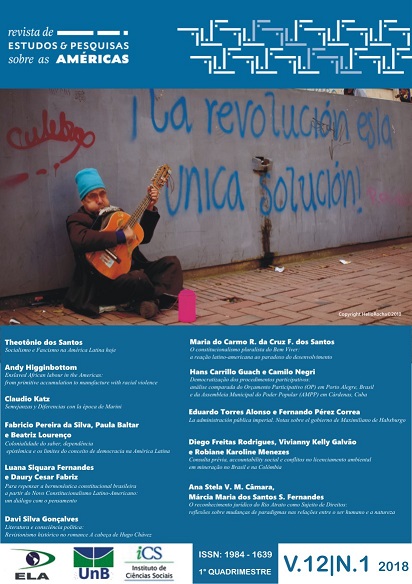Colonialidade do Saber, Dependência Epistêmica e os Limites do Conceito de Democracia na América Latina
Abstract
Esse artigo discute as noções de “democracia” e de “golpe”, a partir de uma reflexão sobre a dependência epistêmica ”“ e consequentemente acadêmica ”“ vivenciada pelas ciências sociais na América Latina, particularmente pela ciência política. Isso será realizado partindo-se de uma abordagem baseada na teoria crítica, entendida de forma ecumênica ”“ o que implica em recolher contribuições analíticas de teorias marxistas, dependentistas, pós-coloniais, pós-estruturalistas, decoloniais, entre outras fontes. Lançaremos mão mais especificamente das noções de colonialidade (do saber) e de dependência (epistêmica). A partir delas, tentaremos entender as limitações das ciências sociais latino-americanas e particularmente da ciência política, de seu espaço e de seu poder analítico ”“ em contraposição a um sistema valorativo do conhecimento baseado numa particular localização geopolítica do saber que se apresenta como “universal”.
Palavras-chave: Democracia; neogolpe; colonialidade do saber; dependência epistêmica.
Colonialidad del saber, dependencia epistémica y los límites del concepto de democracia en América Latina
Resumen
Ese artículo debate las nociones de “democracia” y de “golpe”, desde una reflexión sobre la dependencia epistémica ”“ y consecuentemente académica ”“ vivenciada por las ciencias sociales en América Latina, particularmente por la ciencia política. Eso será hecho por medio de un abordaje basado em la teoría crítica, entendida de forma ecuménica ”“ lo que implica en recoger contribuciones analíticas de teorías marxistas, dependentistas, postcoloniales, post-estructuralistas, decoloniales, entre otras fuentes. Se utilizarán más específicamente las nociones de colonialidad (del saber) y de dependencia (epistémica). A partir de ellas, tentaremos entender los límites de las ciencias sociales latinoamericanas y particularmente de la ciencia política, de su espacio y de su poder analítico ”“ en contrapunto con un sistema valorativo del conocimiento basado en una particular ubicación geopolítica del saber que se presenta como “universal”.
Palabras clave: Democracia; neogolpe; colonialidad del saber; dependencia epistémica.
Coloniality of knowledge, epistemic dependence and the limits of the concept of democracy in Latin America
Abstract
This article discusses the notions of “democracy” and “coup d’état”, from a reflection on the epistemic ”“ and consequently academic ”“ dependence experienced by the Social Sciences in Latin America, particularly by Political Science. This will be done starting from an approach based on critical theory, understood in an ecumenical way ”“ which implies the use of analytical contributions from Marxist, Dependentist, Postcolonial, Poststructuralist, Decolonial and other theoretical sources. More specifically, we will focus on the notions of coloniality of knowledge and epistemic dependence. From these, we will try to understand the limitations of the Latin American Social Sciences and particularly of Political Science, its space and its analytical power ”“ as opposed to a system of knowledge based on a geopolitical location that presents itself as “universal”.
Keywords: Democracy; neo-coup d'état; coloniality of knowledge; epistemic dependence.
Downloads
Downloads
Published
How to Cite
Issue
Section
License
The published material is the property of the Journal, and may be reproduced in whole or in part with indication of the source.
Copyright: Authors will be responsible for obtaining the copyright of the material used. Authors who publish in this journal agree to the following terms:
a)Authors retain the copyright and grant the journal the right of first publication, with the work simultaneously licensed under
the Creative Commons Attribution License which allows the sharing of work with acknowledgment of authorship and initial publication in this journal.
b) Authors are authorized to take additional contracts separately, for non-exclusive distribution of the version of the work published in this journal (eg, publish in institutional repository or as a book chapter), with acknowledgment of authorship and initial publication in this journal.
c) Authors are allowed and encouraged to publish and distribute their work online (eg in institutional repositories or on their personal page) at any point before or during the editorial process, as this can generate productive changes as well as increase the impact and the citation of the published work (See The Effect of Free Access).
















